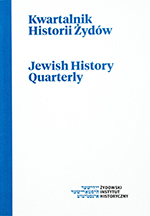Polskie Państwo Podziemne wobec Zagłady
Polish Underground State vs. the Holocaust
Author(s): Adam PuławskiSubject(s): History
Published by: Żydowski Instytut Historyczny
Keywords: Holocaust; Polish Underground State; information policy; picture of the enemy
Summary/Abstract: The article analyses in a synthetic manner the attitude of the Polish Underground State (PUS) to the extermination of the Jews. During the so-called ghettoization (1939-1941) the Polish underground has sympathy for the Jews but considered the Poles to be the main target of persecution. First of all, however, there was the prevalent conviction at the time about the “Jewish betrayal” in the easternmost provinces, the Kresy (the Jews’ actions were of course exaggerated), which led to a growth of anti-Semitism among underground fighters and the Polish people at large. Once the Nazis proceeded to commit mass murder of the Jewish population following the outbreak of the German-Soviet war (after June 1941), the Polish underground decided that the spreading of information about the murders of the Jews would in itself lead to a reduction of the scale of the killing, presumably as a result of the decisions of the Germans themselves. However, this view was not verified as the extermination got wider and wider. The changes took place toward the end of 1942 (when, for example, Żegota, the Council to Aid Jews, was formed), by which time most Polish Jews had already been murdered. In the years 1943-1945, the PUS classified the Jews in hiding and the Jewish underground units as “foreign” or “red” and consequently included them in the broad category of enemies, even though there were also instances of the so-called brotherhood in arms also in respect of Jewish guerrillas. Generally speaking it would be difficult to defend both a theory about Polish-Jewish brotherhood in arms throughout the Nazi occupation period or the views that the PUS should be seen as “helpers/beneficiaries” of the Holocaust, which were the sort of ideas that popped up in the context of the ceremonies marking the 70th anniversary of the Warsaw Ghetto rising.
Journal: Kwartalnik Historii Żydów
- Issue Year: 254/2015
- Issue No: 02
- Page Range: 317-335
- Page Count: 19
- Content File-PDF

